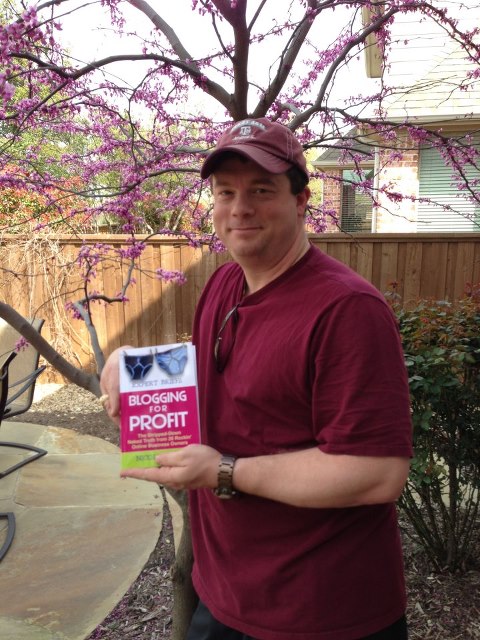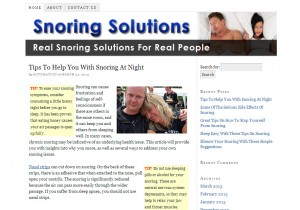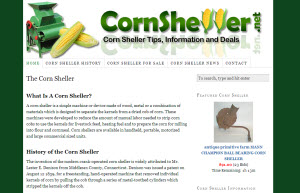Transcript continued from the Episode 053 Show notes
Expert Briefs: Blogging for Profit
 Another really cool thing that happened this week was Nicole Dean’s book, Expert Briefs: Blogging for Profit, came out.
Another really cool thing that happened this week was Nicole Dean’s book, Expert Briefs: Blogging for Profit, came out.
I’m featured in that book and you can check it out at LateNightIM.com/ebriefs. That’s a link into Nicole’s promo for the book, so if you buy the book quickly you can get special bonus material. It’s the typical Kindle launch type of thing that a lot of people do to try to create buzz for their books.
Nicole’s book is doing really well. Of course, I’m excited about it because I’m featured in it several times.
One piece that I wrote for the book that’s really cool is when Nicole asks, “What do you do to establish credibility online?” I wanted to read to you what I wrote, because this is what I try to be all about.
Mark Mason says: For me, credibility is 100% about honesty, integrity, and transparency.
Honesty is about telling the truth, even when it’s not fun. Integrity is the stuff that you do when no one is watching. Transparency is about letting people know what you are doing and why you’re doing it. If you master those things then credibility follows automatically.
Once you’ve established honesty, integrity, and transparency, you can start to think about becoming a thought leader or expert in your niche. This always means sharing things that you do know about and admitting the things that you don’t know about.
I go on to talk about what it takes to be an expert in a niche, but I think this is true in most parts of life and certainly true in internet business.
If you’re trying to establish yourself as an expert and an authority, the first thing to realize is if you spent some amount of time trying to understand whatever it is that you’re topic area is about and you’ve done hours or tens of hours, or maybe in some cases hundreds of hours, if you’ve done hours of work of real study, read five or six books or spent time gathering information on the web, you’re automatically knowing more about a topic than someone who is trying to find out information for the very first time on it.
This thing of “expert” a lot of times is relative to the person who is asking the question. For example, I am not the world’s foremost expert on internet business, but I know a heck of a lot more about internet business than most people that are just getting started. The thing about it is you need to be straight up with people about what it is that you do know and what you don’t know. That’s the transparency and integrity part.
I think that’s the real important piece of having a credible internet business is having honesty, integrity, and transparency in your business. Then the expert status will follow, because after all once you have those three things people can decide for themselves whether or not they consider you an expert.
In any case, Expert Briefs is all about the different stuff that you can do if you’re trying to blog for profit. It’s great for niche marketers and bloggers. It has about 15 chapters and input from 26 different internet business people, most of whom I know, like, and trust. Go ahead and check that out with Nicole, I think you’ll really like it.
Update on Snoring Niche Website
I wanted to give you an update on the snoring site. I have solved the mystery of the snoring site. Speaking of transparency…
Sometimes I’m kind of a ready, fire, aim sort of guy. I have a lot going on and a lot of times I talk about the right things to do, but I don’t exactly do them. Do as I say, not as I do kind of thing. Most of the time it’s just because I’m hurry or I’m being lazy, or whatever.
 In the case of the snoring site, the idea was to quickly throw up a domain and just pump articles into it from Jon Leger’s tool, Article Builder. You can check that tool out, it’s still up and running and it’s still an awesome tool, over at LateNightIM.com/ab.
In the case of the snoring site, the idea was to quickly throw up a domain and just pump articles into it from Jon Leger’s tool, Article Builder. You can check that tool out, it’s still up and running and it’s still an awesome tool, over at LateNightIM.com/ab.
Article Builder is this tool where you can get lots of content, essentially it’s very much like PLR content but it’s relatively unique and in some ways a lot better than PLR that you might buy off the shelf.
I was going to just fill a site up with that and see what happened in terms of traffic, and nothing happened. Weeks and months went by and there was no traffic. I did a little backlinking to the site and there was no traffic. When I did this, I just went out one day and bought a domain, put a site, and rocked and rolled. It was a very quick and dirty test.
A couple weeks ago I had labeled it a failure. You can see that site and what it looks like, what kind of content the automated blogging software had, all of that at SnoringSolutionsSite.com.
It’s not the best site in the world, but I’ve certainly seen more traffic for worse sites. There’s a ton of unique content there, but nothing happened. I was really kind of scratching my head over that.
Then as part of this Forever Affiliate thing I ran across a reminder that when you register domains you really need to look and see whether or not that domain has been registered before. If so, you need to study the backlinks and see what the deal is with any backlinks.
I didn’t quite get that far, but as soon as I pulled the WhoIS data on the domain, I found that it had been registered multiple times, it had changed registrars a bunch of times, and basically this is clearly a domain that has been trashed by some spammy internet marketer who was generating thousands of backlinks to the site and it got slapped by Google and dropped – and then I picked up.
So I’m almost positive that’s what was wrong with this experiment. I have another URL and we’re going to try this with the snoring niche again. I have a URL picked out that is absolutely brand new that has never before been registered. I’m going to put up a site and add content to it at the rate of one article every day or two. Then we’ll see what happens.
The reason I’m still interested in this is because Josh Spaulding has recently done an experiment like this and he’s showing a ton of traffic as a result of doing this. This is the first time that I’ve seen a thing that could possibly be really just fully automated fire and forget kind of blogging, so I’m interested in that.
It’s not one of the these things that necessarily makes the internet a better place in the sense that I’m not out there creating something that’s better than WebMD. But it is considerably less spammy than some of these other things. I am the kind of guy who tests these kind of things. I’m not saying that it’s right or wrong at this point, I’m just saying it’s very interesting. We’re going to test this and see what happens and I’ll let you know.
And that’s the story on the Snoring Solutions Site.
Update on Corn Sheller Niche Site
 As far as the Corn Sheller Site is going, it has recovered and it has some earnings. It’s not quite back up to what it was a couple of months ago, but it is back in the more than $10 but less than $100 per month range. That’s encouraging.
As far as the Corn Sheller Site is going, it has recovered and it has some earnings. It’s not quite back up to what it was a couple of months ago, but it is back in the more than $10 but less than $100 per month range. That’s encouraging.
I have created a page in an effort to rank for a pretty expensive product on Amazon that is related to corn shelling, it’s called a corn creamer. Apparently some people search for that and buy it.
That page is currently ranking 10th in Google, so I’ve made it to page one. I’m going to do a little backlinking to that page and try to get that up and ranking to see if I can create some Amazon sales additionally on the site.
This is a very valid strategy for niche marketers out there. If you have a site with some authority, you can write a product review for something that’s related to your niche, carefully consider your keywords, and start generating revenue almost immediately as soon as you can get that page to rank. Usually just by virtue of the fact that you’re putting it on a real domain that Google has already ranking for other terms, you can get onto the first page pretty quickly.
In this particular case, the competition for this corn creamer is pretty low competition. I suspect with a little effort that I will be able to get on the first page of Google.
And that is what’s going on with the Corn Sheller site over at CornSheller.net.
Niche Research and Finding Keywords
Last week we talked about finding these niches and I’ve been doing a lot of niche research with Forever Affiliate. I’ll tell you, finding really good niches is not the easiest thing in the world. My experience is that hangs up a lot of people, so that’s why we talked about it last week.
What we said last week in episode 52 was that one approach that you could take is sort of a keyword area based approach where you go through and you identify all the areas that you might be interested in. Something like gardening, or a sub-niche of gardening like rose bushes, or some automotive thing or classic cars, or corn shellers, or whatever.
We talked about a bunch of different techniques you could use to brainstorm that list. Go to the bookstore, go to the library, talk to your friends, look at your credit card receipts, and so forth, to see the kinds of things that you’re interested in.
Side-by-side with that we said that one of the most powerful things that you can do in terms of niche marketing and one of the things that Forever Affiliate is about is you can target particular products, because by the time that somebody gets down to searching for information about a particular product, when they’re looking for a review trying to make a final buying decision, “Is this really what I want to buy?” or they’re looking for the best place to buy it or the cheapest price, they have their credit card in their hand and they’re ready to go. We talked about ways to make a list of products that you were interested in and could talk about.
So you have these two lists. Maybe they’re even on the same piece of paper, going down the left hand side and the right hand side. What would be a best case scenario is if you could find a short list of products that were grouped together that were in the same niche and the niche was a niche that you cared about from your other list.
For example, a buddy of mine is into road bikes, these bicycles that cost $5,000 to $10,000 and you ride them very fast down the road and try not to get hit by cars. That’s what he does with his spare time, that’s his exercise, he rides these very expensive bicycles. I think he has a Canondale or some carbon fiber bicycle that cost him like $7,000.
Then on top of that there’s all this specialized equipment that he has that he also knows a lot about. There are things to measure your speed and distance. There’s all kinds of special pedals, brakes, spokes, gears, and all this kind of stuff.
It turns out that if you can find a niche that you’re interested in and a list of products that are related to that niche that are something you know about, care about, or are interested in learning more about, that can really be a great first website for you. This is something you already kind of know about, you already kind of care about it.
The only question is, “Is it a good niche to pick?”
There has to be some criteria for deciding whether or not these keywords are good.

So if you know, for example, that you want to create a website about road bikes and about the equipment that road bike riders use, and maybe you’re even imagining what the site looks like.
The reality is you’re going to depend on free traffic from the search engines, at least that’s mostly what we talk about on this show. If you’re going to do that the question is, “Are you picking topics and keywords of things that people are typing into Google? Are these things that are worth targeting? And are these things that you are going to be able to win?”
For example, let’s say that there’s this very special set of handlebars that you can buy for these bicycles. Let’s say that your idea is that you want to create a review of these handlebars; you love them, they’re your very favorite, and you’re going to create the best review on the internet. It’s going to be 2,500 words with lots of pictures and it’s going to be more authoritative than Wikipedia. We’re talking about this is going to be better than the manufacturer’s site, because you know, like, and trust these handlebars and you’re going to rock and roll this review.
If only 25 people a month are searching for these handlebars then that may not be worth your time. But if 2,500 people a month are searching for these handlebars then that very well could be worth your time.
The way you decide on these keywords is sort of a three or four fold test. The questions you have to ask are;
- Are people searching for the terms that this article would rank for?
- What’s this article about? (or) What’s this website about?
- Are people searching for that?
If they’re not then full stop, because there’s not any sense in building a website that people aren’t looking for if your goal is to monetize it. That’s the first thing is finding out if there’s search traffic.
When it comes to search traffic I typically look at exact match searches. Not broad match, not phrase match – exact match. We’ve talked about that previously. I’m usually looking for thousands of searches per month, not hundreds and not tens of thousands. Almost always, anything that is being searched tens of thousands times per month is going to be too competitive for me to win. So I’m usually looking for something that has thousands of searches per month, just to give you an idea. I’ll tell you a little bit about exactly how we decide whether or not we decide these are okay, but that’s kind of what I’m looking for.
The other thing I’m wondering about, and we’ve talked about this many times before, is if people are making money with this keyword. My quick and simple test is if there are ads in Google. When you do a search, do you see ads down the right hand side? If you do that means people are almost certainly making money. That’s a really good indication, because if no one is making money people can’t afford to buy ads so that’s a pretty clear indication.
The other thing that I’m looking for is I’m going to look at how tough the competition is. This is probably something that we probably need to take a full episode and discuss.
Basically what I’m looking for is what kind of competition do I have on the first page of Google. Do I have guys like me, other websites that I’m just going to be a guy with a little website, or do I have Wikipedia and WebMD and CNN, do I have press releases, individual pages from Amazon.com?
Once I look at all of that stuff, who I’m competing with, I’m going to want to try and understand why they’re ranking. The easiest thing to do is to use a tool like Majestic SEO or Market Samurai or Keyword Canine. The tool that I use is Keyword Canine.
Keyword Canine will give you some rating of the competition and it will tell if the keyword is easy or not, sort of difficult or not, or really hard or not. Then when you drill down on the keyword it will tell you who is ranking for the keyword and what sort of backlinks that competition has that is allowing them to rank for the keyword.
Basically I’m deciding, first, “Is this worth ranking for?” That’s the first test that we talked about, if there are enough searchers to care about.
The second thing I’m doing is some sort of analysis about whether or not it’s possible for me to rank. Again, that is something that we could do a full show on.
Then the third thing that I’m trying to figure out is what’s going to happen if I do rank. We’ve talked about this in the past before, but I’m going to do some kind of mini economic analysis on what the profit is going to be for this keyword.
Am I going to get 100 visitors a month to my website from this keyword or 1,000? How many of those people do I expect to buy based on some simple estimates of what the conversions might be? What’s the profit?
If my commission on affiliate sales from my webpage is a nickel, I’m going to need a lot of visitors. If my commission is $500, I’m going to need significantly fewer visitors to make this page worth building, to make the work worthwhile.
One of the things that Andrew talks about in Forever Affiliate is that it’s not really whether or not you should or shouldn’t attack a keyword. It’s really more about is this keyword easier or harder than some other keyword or niche that you’re considering. And given your goals for your business in terms of how soon you want to be profitable, how much you want to be profitable, what your overall portfolio, is it worth it to you, is this the right keyword for you to pick.
It’s not so much really green light or red light, it’s “this keyword is a lot of work, this keyword is less work but it’s not quite as profitable, how much work do I want to do, how interested am I in it,” and that sort of thing to make a value judgment. That’s one of the things Andrew has talked about recently in Forever Affiliate, and I think that’s a pretty cool way to think about this.
Your tests for finding this niche are… Are there keywords in this niche that are in my area of interest, either in terms of a topic thing or in terms of a product thing? The combination of both is absolutely the best possible combination if you’re going to build a really good affiliate website.
And then are there people searching for these keywords? Are there enough people that are looking for the things that I’m going to be talking about to make it worthwhile so that it makes sense for me to go ahead and do this thing or not.
If that’s true then the question is, “Who am I competing against for these keywords?” Am I competing against big massive authority sites or am I competing against somebody who is just like me who I can beat? One of the judgments that I use is what the number of backlinks to the site is. That’s an oversimplification, but tools like Keyword Canine can give you a more sophisticated view of what’s going on there in terms of competition. Market Samurai also has this capability.
Then finally, what I’m going to do is say, “If I win this and I’m converting orders, is the combination of search traffic and the conversions that I’m likely to get based on my best guess worth whatever investment in time and/or money that I’m going to make to get this thing to work?”
That’s how I approach this. It’s fun for me. And one of the reasons that I’m in Forever Affiliate is I’ve talked about a lot of this stuff over the years piecemeal, but one of the things Andrew is really good at is bringing all of this together in one kind of obvious step-by-step process that people can really follow.
The cool thing is that a couple of people in Forever Affiliate that just started building sites using Andrew’s model a couple of weeks ago, I guess it would have been four weeks now, they’ve already seen their first sale. That’s really cool.
None of them are rich and retired yet. There’s no, “I made $52,000 on Clickbank with five minutes of work and this piece of software.” It’s not like that. It’s a lot of work, but it’s building a real sustained platform for affiliate marketing. And after a few weeks a couple of people have made a couple of sales, which is really neat to watch happen.
Those people are very fired up and excited because that is an early indicator that they are well on the right track for making money with Forever Affiliate. That’s really cool and I’m really enjoying that.
That’s what on tap for this week with regard to selecting niches. I’d like to issue this challenge to you…
If you are having trouble selecting a niche for whatever project you’re working on, if you have questions about keyword research, if you’re stuck and just need help trying to understand this, please give me a shout out over at the blog; LateNightIM.com/053 or LateNightIM.com/feedback. I’d love to hear from you and we can discuss this internet topic in some detail and I’d be happy to try and answer your questions.
Listener Question: WordPress Posts or Pages?
Speaking of feedback, over on the Facebook fan page we’ve been having some discussions about some topics and I thought it would be cool to at least touch on one of them today with some of the time that I have left.
The latest question that we got over on Facebook is from Ian. He says he listens to the podcast every week and he loves it. Thanks, Ian, I really appreciate hearing that.
His question is with the Corn Sheller Site did I use posts or pages and why. If you use posts, how do you do it so that it doesn’t archive and so forth?
Let me tell you how I do this. Typically for a site like the Corn Sheller Site I will use pages for things like the disclaimer, the privacy policy, and the contact information. I will turn comments off on those pages, which is typically the default on most themes is that there are no comments on page. For content, something that looks like a blog post, I will actually use posts. I do that for a couple of reasons.
One is typically I’m doing something where I want the content to briefly appear in some form on the first page so that it will get well indexed and possibly even linked to and so forth. The second reason I do that is that posts are in the RSS feed. I know there are plugins that you can use that will put your pages in the RSS feed as well, but I just go ahead and use posts for most of the content on the site, with the exception of things that I want to organize in a menu structure.
If it’s going to show up in the menu I will almost always use pages, because most of the themes that I use handle pages well in the menu. The example on the Corn Sheller Site is that the store pages that are changing dynamically and I don’t really want comments there because they’re eBay listing and someone will invariably ask a question about something that’s going to be gone tomorrow, so I don’t allow comments there and I will use pages there.
I hope that answers your question, Ian. If you or anybody else has any questions about posts versus pages on an affiliate site, please feel free to give me a shout on the Facebook fan page at LateNightIM.com/facebook.
Wrapping Things Up
That about wraps it up for this week. I just wanted to once again reach out to you and ask you for a five star review in iTunes.
If you are loving the show, and I hope you are, let me know about it. If you’re not loving the show, let me know about that too. I take those comments very seriously and if you have constructive criticism or feedback or something that you’re not getting out of the show that you’d like to get out of the show, let me know because that’s something I’m going to take very seriously as well.
If you go to LateNightIM.com/iTunes and leave me a review that really helps me out in the iTunes search engine and I’d love to see you over there.
Thank you for listening to the Late Night Internet Marketing Podcast…





